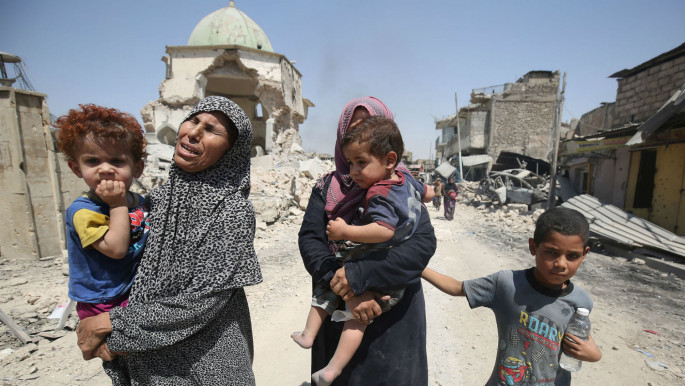Battle for Mosul: Death toll 'may never be known'
Iraqi Prime Minister Haider al-Abadi declared victory against the Islamic State group in the city on Monday, eight months after an alliance of Iraqi armed forces, Shia militias and Kurdish fighters launched an offensive to retake the city. On Tuesday, Syrian monitors confirmed the death of the militants' leader, Abu Bakr al-Baghdadi.
The cost of "liberation", however, has been immense.
Fighting in western Mosul destroyed entire districts of the city with the scale of destruction unprecedented in Iraq's most recent conflict.
The UN estimated this week that the cost of repairing basic infrastructure is set to top more than $1 billion, with rebuilding likely to take several years.
| Read more: Anticipating Mosul's post-Islamic State future |
Nearly a million people fled their homes during military operations in Mosul, while thousands have been killed.
Monitoring group Airwars estimates that between February and June as many as 5,805 Iraqi civilians were killed in Iraqi and coalition attacks.
The actual number is likely much higher.
"The true death toll of the west Mosul battle may never be known," Amnesty International said in a report released on Tuesday.
'Terrible toll on civilians'
The rights group documented the conflict between January and mid-May, finding that the Islamic State group, Iraqi forces and the US-led coalition all committed gross violations of international law during fighting.
"Iraqi and coalition forces failed to take adequate measures to protect civilians, instead subjecting them to a terrifying barrage of fire from weapons that should never be used in densely populated civilian areas," said Lynn Maalouf, director of Middle East research at Amnesty International.
Repeated barrages of "indiscriminate or disproportionate attacks" were carried out in densely populated areas using explosive weaponry with crude targeting capabilities, Amnesty said, talking a "terrible toll on civilians".
Necessary precautions to prevent the needless loss of civilian life were not taken, the rights group said, in some cases constituting "disproportionate attacks".
'Disregard for human life'
On March 17, 105 civilians were killed by a US airstrike targeting two IS snipers.
Amnesty says Iraqi authorities and the US-led coalition repeatedly failed to provide effective, or practical, warnings of such imminent deadly attacks.
Leaflets were often dropped before airstrikes, but proved futile given heavy IS restrictions on civilian movement.
Read more: The Iraq Report
"There were flyers dropped in our neighbourhood, but IS would execute anyone with a flyer in their hands," one resident from the al-Hermat neighbourhood in western Mosul told Amnesty.
Some of the leaflets instructed people to hang children's clothes on their roofs to show they were civilian houses, but residents say different Iraqi pro-government forces often ignored the signals and bombed civilian homes.
 |
|
|
Iraqis walk by the destroyed Al-Nuri Mosque |
"It is also inconceivable that pro-government forces were unaware of the terrible cost to civilians of using overhead explosive ordnance in these areas," Amnesty said.
The Islamic State group also committed egregious war crimes in Mosul, using civilians as "human shields" and summarily killing "hundreds, if not thousands" as they tried to flee, often hanging victims' bodies in public places.
"The horrors that the people of Mosul have witnessed and the disregard for human life by all parties to this conflict must not go unpunished," said Lynn Maalouf, director of Middle East research at Amnesty International.
"An independent commission must immediately be established, tasked with ensuring that any instances where there is credible evidence that violations of international law took place, effective investigations are carried out, and the findings made public," she added.
Follow us on Twitter: @The_NewArab





 Follow the Middle East's top stories in English at The New Arab on Google News
Follow the Middle East's top stories in English at The New Arab on Google News


